
We present our list of 50 Asian Films & Documentaries from 2018 you cannot miss!!
This year we weren’t able to cover as much film festivals as we wanted to but still we wanted to share the films we consider important for you to watch. Please note that these are the films we discover in 2018 so there could be productions from 2017. As always we hope you like our selection. Please feel free to share this article with your cinephiles friends and leave a comment below. Thanks
 A Family Tour by Ying Liang
A Family Tour by Ying Liang
Taiwan, Hong Kong, China, Singapore, Malaysia | 2018 – 107 min.
Because of films criticizing the Chinese government, director Yang can’t make films in China anymore and has been living in Hong Kong for five years like as a political refugee. With her Hong Kong husband and her four-year-old son, she appears to be living as a stable Hong Kong resident, giving lectures and planning a new film. When the movie starts, however, the family leaves for Taiwan secretly, like the characters in a spy movie. Yang’s mother, left alone in China, arrives in Taiwan as a member of a Chinese tour group. After her daughter left, the mother suffered from periodic inspections by the Chinese police and gives her daughter all the tapes she recorded. Unlike the simple title, A Family Tour, we first need to reflect the modern history of China, Ying Liang’s film journey, and his fight against oppression and to protect the freedom of artists. In that way, we can fully understand the internal affairs of this family, who have to choose Taiwan, not China or Hong Kong, for a brief family reunion. (Sung Jihae)
Trailer:

A Land Imagined by Yeo Siew Hua – Singapore | 2018 – 95 min.
Set in industrial Singapore, police investigator Lok must find a missing migrant worker named Wang. Wang suffers a worksite accident and is anxious about repatriation. Unable to sleep, Wang starts frequenting a dreamy cybercafé in the dead of the night. Hoping to look for some form of human connection in this foreign land he feels alienated from, Wang forms a virtual friendship with a mysterious gamer that takes a sinister turn. When Wang suddenly disappears, Lok digs deep into the trail leading to a land reclamation site, in order to uncover the truth beneath all that sand. (QCinema Film Festival Catalogue)
Trailer:

Adulthood by Kim Inseon – Korea | 2017 – 92 min.
At her dad’s funeral, Kyungun meets her uncle Jaemin, a complete stranger. He bilks her father’s insurance money. She demands her money back, but he unashamedly refuses. To get her money back, she joins his next scam (JIFF Catalogue 2018).
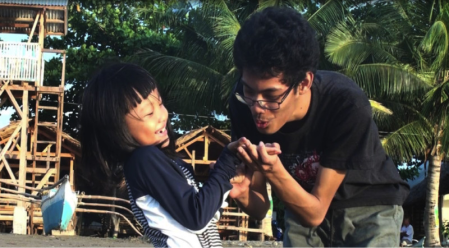
All Grown Up by Wena Sanchez – Philippines | 2018 – 70 min.
A filmmaker closely follows her teen brother as he starts a new life in college. Although her brother is smart, he is a bit of an oddball and finds it hard to navigate the world like a normal teenager. However, as she monitors his progress, the filmmaker notices similar traits on her own daughter. This makes her question her ability to help the people she loves the most.
Trailer:

Amiko by Yamanaka Yoko – Japan | 2017 – 66 min.
Amiko falls helplessly in love with the cool boy Aomi. She thinks he is cool, like her. But then he shacks up with another girl who is “the embodiment of mass culture.” Confronting a stupid world of lies and mediocrity, Amiko remains a wild romantic and chooses her own way to mourn her lost love. This zany film forges a new expression of pure love, with Amiko’s cynical and selfdeprecating inner monologue going off like a vibrant stand-up comedy. Audience Award, PIA Film Festival. (HKIFF Catalogue)
Trailer:
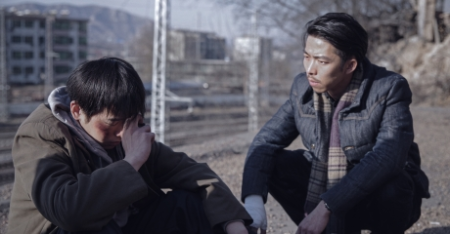
An Elephant Sitting Still by Hu Bo – China | 2017 – 230 min.
In Manzhouli, people say there is an elephant that simply sits and ignores the world. A rookie accidental killer, a man who seeks revenge for his brother, an old man about to be abandoned, and a girl behind bars, all long for escape from the downward spiral and see the elephant. Hu Bo’s electrifying directorial debut is a mesmerizing tale about the emotional negative space in a city where all shattered characters are heading nowhere. Tragically, it’s also the final chapter in his legacy. The writer-director took his own life at age 29. (HKIFF Catalogue)
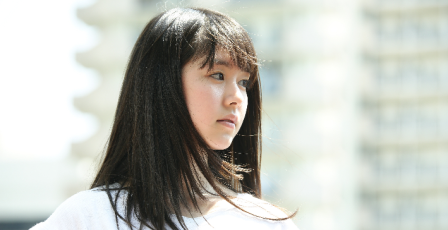
Asako I &II by Hamaguchi Ryusuke – Japan | 2018 – 119 min.
Asako’s life feels empty and banal after her first love Baku suddenly disappeared 2 years ago. She’s attracted to Ryohei who looks like Baku but has a totally different personality. Her heart stirs again, but she doesn’t know whether it’s Ryohei she likes or the image of Baku he resembles. That is until Baku returns. In her attempt to part with her memories, she goes after Baku.Perhaps we all exist at each moment, but do not exist in any moment. The memory of first love is a dream-like moment and then a moment of suffering and pain. Self-honesty when facing up to the illusion of first love is as painful as childbirth and letting go isn’t nice and pretty. Nevertheless, the morning with Baku that Asako awaited is her way of cooking up the courage to duly face her present love, overcome growing pains, and step forward towards a new beginning. This film is about waiting and watching how she bids farewell to a first love that may be too foolish to be considered innocent. (Jung Jin-a)
Trailer:

Birds without names by Shiraishi Kazuya – Japan | 2017 – 124 min.
Based on the novel of the same title by Numata Mahokaru, which received rave reviews for its remarkable aesthetic style and astute psychological descriptions, Birds without Names exemplifies and enhances the merits of the original novel. These include an unconventional narrative flow, an overall enigmatic mood, and the bizarre relationships that ensue due to the various facets of the unusual cast of characters. Unemployed Towako, who makes her presence felt by phoning in complaint calls to a department store, stays with Jinji, who is 16 years her senior and a day laborer. Jinji provides everything for her, from basic food, clothing and shelter to sexual pleasure, but he is completely ignored by Towako. Even though their extremely unfair and unbalanced relationship doesn’t seem to have a way forward, it does create some sort of presence, a bit like a stronger, more solid wax castle for her than any other relationship she has ever had before. This film depicts the revelation of what this solid castle really is in a strange and oddly interesting way. (PARK Jin-hee – BIFF Catalogue)
Trailer:

BNK48: Girls Don’t Cry by Nawapol Thamrongrattanarit
Thailand | 2018 – 108 min.
All Asia is abuzz by participation-type idol-auditions. The situation in South Korea is the same, with all of them airing in a heat wave following Produce 101 series and recently ended Produce 48. The film, BNK48: Girls Don’t Cry stars the members of the BNK 48, Thai sister group of AKB 48 which is prototype of the idol audition group in Japan. Girls who audition with vague ambitions or a fairly specific vision for idols are soon driven to unlimited competition and are at odds with ‘Me’ as people want and ‘Me’ as is. While starring idol group members as main characters, this film, which features sincere interviews of characters rather than their flamboyant performances or fresh music, suggests audience to think about the light and darkness in the Asian idol industry. Unlike the title, Girls Don’t Cry, seeing the girls crying too much makes our heart sore. (Huh Kyoung)
Trailer:

Bori by Kim Jinyu – South Korea | 2018 – 110 min.
Bo-ri, an 11-year-old girl in a seaside village, is the only family member who can hear. As an elementary school student, Bo-ri becomes more and more accustomed to talking with her friends while finding it hard to communicate with her family in sign language. “Why am I the only person born different from my family?” The more she thinks about it, the more she feels alienated. Wishing to be deaf, Bori sees an old woman diver on the TV deafened by a long-term diving. Bo-ri jumps into the sea and loses consciousness. Waking up in the hospital, she pretends she can′t hear. Bori is a heartwarming movie. Not only does Bo-ri have no ill will, but all of her family members actively express their affection for each other. It is a movie starring deaf people, but it shows the bright side of life without using disability as a tragic element. Bo-ri’s intentions are pure, but we cannot support her self-inflicted disability. The movie makes us eager to see things in a positive light where the innocence of childhood and family love meet. (Nam Dong-chul)

Bulbul Can Sing by Rima Das – India | 2018 – 95 min.
The film beautifully portrays miraculous moments in Bulbul’s oppressed life, a teenage girl living in India’s Assam region. The film depicts the power of pioneering a harsh life, close friendships and miraculous moments that look like fireworks in a surprising way. Bulbul’s desires to sing, love her peers, and fall in love are blocked by social demands and prejudices, and Sumu becomes ridiculed for violating gender boundaries. However, Bulbul and her friends enjoy the fullness of life, wandering in the fields and the rivers. Directed, filmed, and edited by Rima Das, the film captures the complexities of life and the places where life is laid in a unique style. The beautiful mise-en-scène, utilizing lamplight in the dark, and the motif of ghosts and water appearing frequently in movies, present death entangled with life, a world of uncertainty and the moment of miracle coexisting. Like the faces of characters appearing mysteriously in the dark, the characters played by non-professional actors maintain a simultaneously realistic and dreamlike attitude. Therefore, Bulbul, and we, can still sing. (Hong Soin)
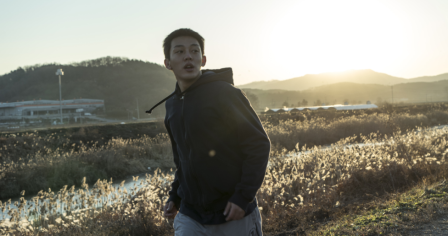
Burning by Lee Chang-dong – South Korea | 2018 – 148 min.
Based on Murakami Haruki’s short story Barn Burning, Burning is about the enigmatic relationship between three people. Jongsu meets childhood friend Haemi, who seems to be lively but somewhat hollow, and falls for her. But Haemi asks him to take care of her cat while she takes off for Africa. When she returns, she is with the young, rich, but mysterious Ben. The tight tension among the three classifies this film as a mystery thriller, but it is still an extension of Lee Chang-dong’s world. Rather than directly burrowing into the inner life of the guilty, the camera sensitively captures the butterfly effect of everything surrounding guilt. The storyline is minimal, but filled with unbelievably dense scenes full of symbolic elements making up a tight-knit net of metaphors. The harmony of music and sound is exceptional. The film is a rare and valuable attempt by the director to disband this era’s mood of loss, anger, and chaos in filmic form and project it into an image. (Song Kyong Won)
Trailer:

Call Her Ganda by PJ Raval – Philippines, USA | 2018 – 94 min.
When Jennifer Laude, a Filipina transwoman, is brutally murdered by a U.S. Marine, three women intimately invested in the case–an activist attorney (Virgie Suarez), a transgender journalist (Meredith Talusan) and Jennifer’s mother (Julita “Nanay” Laude)–galvanize a political uprising, pursuing justice and taking on hardened histories of U.S. imperialism.. (Cinemalaya Catalogue 2018)

Carving thy faith (Pag-ukit Sa Paniniwala) by Hiyas Baldemor Bagabaldo
Philippines | 2018
A sculpture believed to have been imported in town during Spanish colonial conquest, locally known as Mahal na Señor Sepulcro, is celebrating its 500 years. Meanwhile, composed of non-actors, Senakulo re-enacts the sufferings and death of Jesus. As the local community yearly unites to commemorate the Passion of Christ, a laborious journey unfolds following local craftsmen in transforming blocks of wood into a larger than life Jesus crucified on a 12-ft cross. The film is a 5-year visual ethnography of traditional yet practical orchestration of Semana Santa in a small town where religious woodcarving is the livelihood. An experiential film on neocolonial Philippines’ interpretation of Saints and Gods through many forms of rituals and iconographies, exposing wood as raw material that undergoes production processes before becoming a spiritual object of devotion.
Trailer:

Come on Irene (Itoshi No Airiin) by Yoshida Keisuke – Japan | 2018 – 136 min.
42-year-old loser Iwao needs to get laid, like, yesterday. He makes a move on a colleague at the pachinko parlor but goes home simply embarrassed. When he returns, his father has passed away, and he has a wife, bought in the Philippines for 300 yen. His mother Tsuru greets the newlyweds with a hunting rifle. Irene wants financial support for her impoverished family, and Iwao seems decent enough. She gets married but is terrified about the wedding night and escapes from Iwao every time he demands ‘getting it’. Her mother-in-law Tsuru despises her, and wants to replace her with a “nice, polite Japanese girl.” At least the Filipino girls in the village are nice to her and give her good advice based on their bar hostess experiences. In the meantime, recently widowed Tsuru schemes to sell Irene to yakuza gangs—which leads to an unfortunate turn of events. Not your typical Japanese film, but despite its explicit dialogue and unreal situations, this is a highly entertaining one, with an unexpected ending that elicits an ironic mixture of catharsis and melancholy. (Karen Park)
Trailer:

Complicity by Chikaura Kei – Japan, China | 2018 – 116 min.
Chen Liang leaves his hometown for Japan to improve his life, despite the disapproval of his sickly mother and elderly grandmother. Life for an illegal Chinese immigrant with a fake ID is not easy, and one day he receives a call about a job offer intended for someone else. Without hesitation he takes the job and starts working at a traditional Japanese restaurant under a soba master. He even finds a beautiful girlfriend, but is terrified that his identity could be exposed at any moment. Chen Liang’s alienation, mistrust and guilt lead to a snowballing of unfortunate events. The balance and quality accomplished in this Japanese-Chinese co-production belies the fact that this is the debut feature by director Chikaura Kei. The supreme ensemble cast of Lu Yulai and Fuji Tatsuya stands out, and their acting is well supported by the skillful directing, especially in the latter part, when the situation becomes urgent and the tension rises. (Karen Park)

Delia and Sammy by Therese Cayaba – Philippines | 2018 – 84 min.
Upon learning of her terminal illness, faded and forgotten actress Delia has to find family to take care and leave her difficult husband Sammy with, before she dies. (Cinemalaya Catalogue 2018)
Trailer:

Die Tomorrow by Nawapol Thamrongrattanarit – Thailand | 2017 – 71 min.
Emerging Thai director Nawapol Thamrongrattanarit played with life, mortality and choice in his awardwinning Heart Attack (2015). Here, he breaks taboos and looks death directly in the face. Not with the slow decay of the elderly, or the reign of horror films, but with episodic essays of those who die – happy, young, prepared or otherwise. Drawing on news reports and fiction, twelve vignettes ask what it means to say goodbye – and to grapple with how we have lived. (HKIFF Catalogue)
Trailer:

Girls Always Happy by Yang Mingming – China | 2018 – 116 min.
In 2012, Beijinger Yang Mingming bursted out of film school with her short but inventive mockumentary of sorts, Female Directors (2012), in which she and a film school classmate seemed to become recorders of life and love for a new social media generation. She continues to explore female dreams and dynamics in this feature comedy, shifting to a mother and daughter dyad whose quest for fame and wealth through arts takes second place to the verbal interactions that create the film. (HKIFF Catalogue)
Trailer:

Graduation by Hui Jiye – Korea | 2018 – 82 min.
Hui Jiye’s Graduation, as the title tells, is a story about the future path of a university student who is going to graduate soon, but different from gloomy Korean independent films from the time, this film is bright and has no shade. One day, when Haerang, majoring in film production design at college, comes home after taking pictures to be used for graduation album, her mother says she has decided to separate from daughter. As she starts unprepared independent life, she is all by herself without mother or any close friend next to her. Living alone without the fence so called family or friend is so natural in a sense, but she has to struggle dealing with the situation, which makes her look cute, desperate and hopeful at the same time. Hui Jiye’s directing is lively and young, so she delivered the bright energy intactly into the screen. [KIM Youngjin]

Gusto Kita With All My Hypothalamus by Dwein Baltazar
Philippines | 2018 – 105 min.
Scientifically, they say that the heart doesn’t recognise love or any other emotional activity but it’s rather the hypothalamus, a small part of the brain, perhaps just as small as Avenida Rizal, a major thoroughfare in the centre of Manila where the fate of four men intertwine. Each of them longing for a mysterious girl named Aileen. (Cinemalaya Catalogue 2018)
Trailer:

House of My Fathers by Sivakumaran Suba – Sri Lanka | 2018 – 95 min.
The Sri Lankan civil war triggered by the massacre of Tamils has engraved a devastating memory of bloody conflict between the Sri Lankan military and the Liberation Tigers of Tamil Eelam. During the civil war, two villages—one Tamil and the other Sinhalese—experience a mysterious incident that stops people from conceiving children. Then a message from the gods says the villages must send one Sinhalese man and one Tamil woman to the Forest of the Dead and find out the secret of recovering life. But there is a condition: only one can return from the trip. As the chosen Asoka and Ahalya depart, they encounter the moment of truth while reminiscing on personal and community histories. This is the debut film of director Suba Sivakumaran, a cinematic reconstruction of a politically sensitive theme and a part of tragic history. The film is a poetic rendering of trauma caused by long-lasting political conflict, that conveys a strong message through fantasy and metaphor. (Kim Young-Woo)

Kung Paano hinihintay ang dapithapon by Carlo Catu
Philippines | 2018 – 90 min.
An old unmarried couple broke the monotony of their daily lives when the woman’s estranged husband reached out to them, seeking reconciliation and forgiveness.
Trailer:

Land of Sorrow by Lee Johoon – Korea | 2018 – 76 min.
Farmers, seeking excellent rice yields from 330 ha of reclaimed farmland in Seosan city, don’t look as happy as they should be. A story dating back 50 years, the dark side of history, explains it all (JIFF Catalogue 2018).
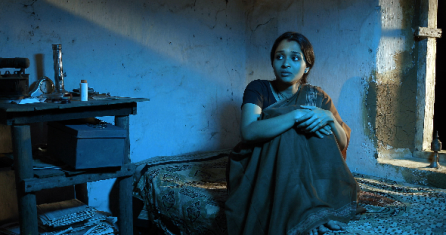
Light in the room by Rahul Riji Nair – India | 2018 – 97 min.
Set against the backdrop of a beautiful hilltop village, surrounded by a dense forest and a decaying tea plantation, is the story of Sudha, an under privileged woman who reaches here after getting married to Chandran. They stay with Chandran’s brother and ageing mother in a confined single room house with a make shift separation to create space for the couple. The room has a strange light without a switch, which changes colours often. While Chandran calls the light his invention of a lifetime, it deprives Sudha of her privacy and begins to haunt her. Adding to her woes, Chandran physically exerts his dominance over Sudha. Amid deep trauma, Sudha realises that she doesn’t have any support and decides to fight. (Mumbai Film Festival catalogue)
Trailer:
Categories: News



I need to watch more movies like this 🙂 Thanks for the share 🙂
LikeLike